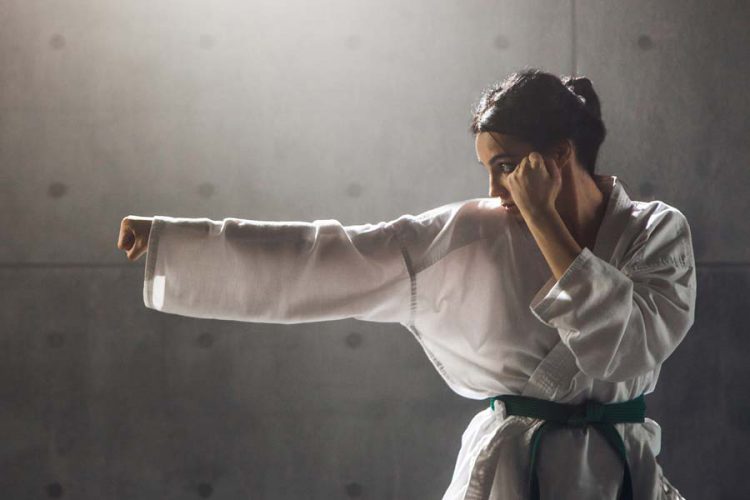
Karate: much more than a sport; a discipline!

Karate is a Japanese martial art. Depending on the style of karate practiced, the karateka (karate practitioner) will learn different techniques for warming up, physical training, strikes, self-defense, fighting and Katas (execution of techniques/movements against a fictitious opponent).
In karate, which muscle groups are most used and how can we train them?
All the muscles in our body are used, but more specifically the muscles of the legs (calves, quadriceps, hamstrings and glutes) and abdominal and dorsal regions. Indeed, the motions and techniques are initiated in the legs and the strength exerted from the ground is transmitted to the whole body. Good core stability will also help the karateka improve his/her stability and balance during different techniques.
Since karate requires power, speed, endurance and balance, muscle/physical training will be geared toward these components to enable the karateka to increase his/her efficiency. Acquiring these elements will also enable the karateka to improve his/her posture and facilitate all the physical tasks performed daily (e.g., transporting/lifting loads, static endurance)
What are the most common injuries when practicing karate and how are they treated?
Depending on the style of karate practiced (with or without limited contact during fighting), injuries may vary. The most common injuries occur in the wrist/hand/fingers as a result of multiple strikes (sprain and fracture), the ankle (sprain) and the knee (sprain, pulled muscle). Because of the blows that are dealt, bruised muscles and even a concussion may also be seen.
SPRAIN : pulled ligament. The severity of the injury depends on the grade of the lesion and proportionally influences the prognosis for recovery.
Signs and symptoms:
- Pain
- Swelling
- Restricted mobility with or without a limp in the case of a sprained ankle or knee
- Weakness
- Diminished balance (stability)
Treatments:
- Managing pain and inflammation: Ice, elevation, compression bandage, rest, electrotherapy and crutches are a few relevant treatments
- Restoring joint range and flexibility: manual therapy and mobility exercises and stretching
- Increasing muscle strength and proprioception: strengthening and stability exercises
- Gradual return to activities and sports: Training tips and progress.
CONCUSSION : traumatic brain injury caused by an external force, resulting in injuries such as an impaired state of consciousness and cognitive, behavioral and physical disabilities.
Signs and symptoms:
- Headache
- Fatigue/sleep disturbance
- Nausea
- Dizziness/vertigo, feeling slow
- Concentration or memory disorders
- Blurred vision, sensitivity to light or noises and emotional lability.
When an injury occurs, it becomes a good idea to talk to your physical therapist quickly in order to have a detailed assessment of the problem, to determine a treatment plan and to seek appropriate advice for the situation to facilitate your recovery and your return to the sport.
Treatments:
- Initial rest period lasting at least 48 hours:
- Limiting intellectual activities that require concentration
- Fostering a calm environment
- Not participating in physical activities
- Not consuming alcohol/drugs
- Limiting driving
- Protocol for a gradual resumption of intellectual activities
- Resumption of home activities over a short period of time (15 to 20 min)
- Gradual resumption of structured activities on a part-time basis (school/work/hobbies)
- Gradual resumption of structured activities on a full-time basis (with adjustment if necessary)
- Protocol for a gradual resumption of physical activities and sports (wait 24 hours between each stage), all as tolerated.
- Very light activities without increased symptoms (15 to 20 min)
- Light individual aerobic activities (20 to 30 min)
- Individual exercises specific to the activity/sport
- More demanding exercises/training (if no daily symptoms)
- Unrestricted training (medical authorization needed for contact sports)
- Return to competition
Did you know that one of our physical therapists, Jayson René, is a karateka himself? If you have further questions about this sport or about karate-specific physical training or to make an appointment with him, feel free to contact us directly at the clinic.


